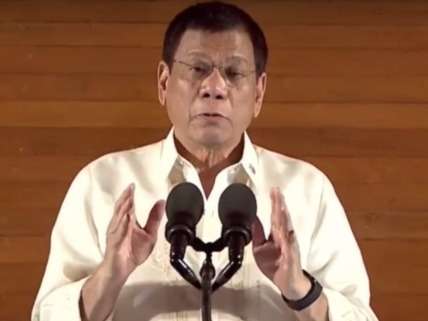'What a Great Job You Are Doing,' Trump Tells Thug Who Fights Drugs With Murder
Trump praises Philippine President Rodrigo Duterte's war on drugs, which is tied to thousands of extrajudicial killings.

Last month critics of Philippine President Rodrigo Duterte's murderous anti-drug crusade were dismayed by the official White House summary of a "very friendly" telephone conversation in which Donald Trump praised the bloodthirsty authoritarian for "fighting very hard to rid [his] country of drugs." A newly revealed transcript of the April 29 call, prepared by the Philippine Department of Foreign Affairs and published yesterday by The Washington Post, shows that Trump's comments were even more alarming than they sounded in the summary.
After some initial pleasantries, Trump announces the purpose of his call. "I just wanted to congratulate you because I am hearing of the unbelievable job on the drug problem," he says. "Many countries have a problem. We have a problem. But what a great job you are doing, and I just wanted to call and tell you that."
Duterte thanks Trump and adds, "This is the scourge of my nation now, and I have to do something to preserve the Filipino nation." Trump repeats his unqualified endorsement of Duterte's drug policies. "I understand that and fully understand that," he says, "and I think we had a previous president who did not understand that, but I understand that, and we have spoken about this before."
Trump is alluding to Barack Obama's criticism of Duterte's methods, which have included thousands of extrajudicial killings, routine falsification of evidence, and public incitement of murder as a justified response to drug addicts as well as drug dealers. While Obama may have had a problem with Duterte's approach, Trump is saying, he understands that fighting drugs requires extreme measures.
Since Trump is clearly aware that Duterte's war on drugs has attracted international criticism, it is hard to excuse his enthusiasm as a product of ignorance. In fact, his own State Department has raised concerns similar to those heard from the Obama administration. Last month Patrick Murphy, the deputy assistant secretary of state for Southeast Asia, said American diplomats "have a very sustained and deep concern when elements of the drug war are operating outside the rule of law," adding that "the growing number of extrajudicial killings is troubling." Trump not only seems to have no such qualms; he wants Duterte to know he has no qualms, which can only encourage the appalling violence that has been the hallmark of the Philippine president's anti-drug campaign.
"We are not here to lecture," Trump said during his recent trip to Saudi Arabia. "We are not here to tell other people how to live, what to do, who to be, or how to worship." The implication was that the United States should not meddle in another country's internal affairs, that the way a government treats its own people is none of America's business.
Trump, who bombed a Syrian airbase in response to the government's sarin gas attack on a rebel-held town, is by no means consistent in maintaining that noninterventionist position, which is sound as a constraint on military action. Whether the same circumspection should extend to verbal expressions of disapproval is another matter. And even if there were an argument for muting criticism of an ally's unjust policies in some situations, it would not require the president to actively encourage systematic violations of human rights, as Trump is doing here.
